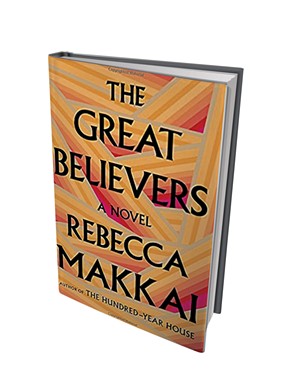
- The Great Believers by Rebecca Makkai, Viking, 432 pages. $27.
How do you write about a historical chapter that many living people still remember with the searing power of loss? Part-time Vermonter Rebecca Makkai faced that challenge with her third novel, The Great Believers. Taking us back to the years when an AIDS diagnosis was a rapid death sentence, it chronicles the devastation of Chicago's gay community.
Getting the facts right, of course, is a must; Makkai has documented her research at length in an author's note and a recent Literary Hub essay. In the note, she points us toward the "direct, personal accounts" of those who were there. Her marvelously absorbing novel is itself a meditation on what it means to survive to write such accounts, to carry through life the legacy of the lost. One character has been "living for the past thirty years in a deafening echo ... tending the graveyard alone."
Composed of two alternating narratives — one starting in 1985, the other in 2015 — The Great Believers hops back and forth in time like memory itself. Time travel, says a character at one point, is "devastatingly easy! All you have to do is live long enough!" It may sound like a lighthearted proposition, but we soon learn that, for some, long life confers crushing burdens.
As the novel opens in 1985, protagonist Yale Tishman, a young "development guy" for a university art gallery, is mourning the first of his good friends to die of AIDS. Midway through the book, he will imagine being questioned about the era decades later: "He'd be the world's luckiest man to stand there at the end of it all, to be the one left, trying to remember. The unluckiest one, too."
One person lucky or unlucky enough to remember is Fiona Marcus, the adoring younger sister of Yale's late friend. A supporting character in the 1980s sections, she's the focus of the 2015 sections, in which she travels to Paris seeking her estranged daughter, who has become involved with a cult.
Initially, Fiona's present-day narrative may read like a needless tangent from Yale's more compelling story. But the better we know Fiona, the more we understand how her entire life — including her struggles as a mother — reverberates with the force of the events Yale is living. It's a series of aftershocks.
Fiona has "spent an inordinate amount of her adult life engaged in two different ongoing fantasies," Makkai writes. In one, she re-creates her brother's lost world, detail by detail; in the other, she walks him through postmillennial life, explaining terms such as "cloud" and "firewall." This "time travel" is a form of obsessive mourning, but it's commemoration, too, a forceful affirmation of her brother's life against oblivion.
These same themes dominate a major subplot of Yale's narrative, in which he attempts to acquire a mysterious art collection from Fiona's great-aunt Nora. An artist and model in Paris before and after World War I, the 90-year-old claims to possess authentic unknown works by the likes of Amedeo Modigliani and Chaim Soutine. But her real motive in donating these valuable pieces is to get a public showing for the obscure artist who was her lover.
It's Nora who says time travel is easy, and who draws a parallel between her own famously "lost generation" and Yale's ongoing experience of loss. "Well, you! Your friends! I don't know how it's like anything other than war!" That transhistorical linking gives its title to the novel: F. Scott Fitzgerald described his generation as "the great believers."
Some might argue that, by linking the worst years of the AIDS epidemic to the earlier tragedy of the Great War, Makkai elides the specifics of both. But The Great Believers includes a wealth of specifics — about the everyday, unquestioned homophobia that still reigned in America during the Reagan years; about the panic and misinformation surrounding the disease; about the activists who fought desperately to make treatments available. Yale's partner runs a gay alt-weekly; his secret crush is a crusading lawyer and organizer.
That's the broader canvas surrounding Yale as he battles Nora's family for her collection. The smaller-scale conflict gives the novel a suspenseful motor and a sense of hope. But, as we flip pages to learn the fate of the artworks, we don't forget that far more is at stake: Which of this generation of "great believers" will live to see 2015?
Makkai manages her two narratives so deftly that our dread of the novel's revelations mounts steadily and almost imperceptibly. It's not much of a spoiler to say the book eventually becomes devastatingly sad. But there's no "misery porn" here, no torturing of characters just to jerk tears. Each narrative also mounts toward a climactic art exhibition — in Chicago and in Paris — that affirms the power of creation, witnessing and memory.
While that memory may be a burden, Makkai suggests the penalties of forgetting are greater. In the 2015 narrative, the Paris terrorist attacks make a young gay man worry that aspects of history will repeat themselves: "Everyone acts from fear, the next year, two years. What happens, you think, to people like us?"
Far from sounding a note of historical triumphalism, the novel reminds us how easily positive change can be undone. "[I]t's fragile," says an older gay character of the advances made over his lifetime. "You might look back in fifty years and say, That was the last good time." Ominous and timely words.










Comments
Comments are closed.
From 2014-2020, Seven Days allowed readers to comment on all stories posted on our website. While we've appreciated the suggestions and insights, right now Seven Days is prioritizing our core mission — producing high-quality, responsible local journalism — over moderating online debates between readers.
To criticize, correct or praise our reporting, please send us a letter to the editor or send us a tip. We’ll check it out and report the results.
Online comments may return when we have better tech tools for managing them. Thanks for reading.